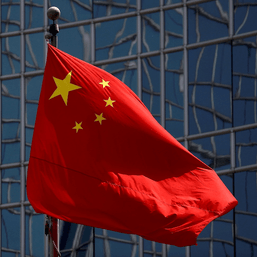SUMMARY
This is AI generated summarization, which may have errors. For context, always refer to the full article.

It seems like ages ago, when China was wooing us with friendly propaganda and trying to influence our taste for popular culture. This happened during the Duterte years, remember?
Let’s go back in time.
In 2018, Chinese shows and movies dubbed in Filipino started to be aired on state-owned People’s Television Network or PTV. This was short-lived, however, because of the uproar from netizens and opposition senators.
Three key points were raised:
- Why use taxpayers’ money to propagate the culture of a country that was harassing Filipino fishermen as well as Navy and Coast Guard vessels?
- “Airing Chinese shows on our state-run network poses a danger of spreading Chinese propaganda sanctioned by our government through our official media stations,” the senators said in a resolution they filed. These shows “may subtly inculcate among Filipinos the authoritarian, one-party state, anti-democratic…principles of the CCP [Chinese Communist Party.]”
- The program went against the charter of PTV: its mandate is to “develop the broadcasting industry as a medium for development, promotion and advancement of Filipino nationalism, culture and values that serve as an instrument in the struggle for Filipino sovereignty, identity, national unity and integration.”
Music video and news
A high point of Chinese feel-good propaganda came in the midst of the pandemic. In 2020, the Chinese embassy released a music video touting the friendship of China and the Philippines, dramatized by the cooperation of both countries when COVID-19 hit our shores.
The song, entitled “Iisang Dagat,” (“One Sea”) was in Mandarin and Filipino. Images of “China delivering various donations to the Philippines, the flags of both countries held by donors and posted on…boxes of medical equipment and sacks of rice” flashed on the screen.
The Chinese embassy said the song was dedicated to frontliners who contributed to the fight against COVID-19 in both the Philippines and China, “especially the China Medical Expert Team to the Philippines.”
“Iisang Dagat,” the title of which played against the backdrop of the seas claimed by China, garnered thousands of dislikes and a few hundred likes on YouTube in April 2020.
An attempt to air Chinese News TV or CNTV followed a year later when the ABS-CBN News Channel (ANC) entered into an agreement with a Filipino-Chinese media company to broadcast a nightly weekday news program delivered mainly in Mandarin Chinese. CNTV claimed that it was “the first news program that regularly reports Philippine headlines in Mandarin Chinese.”
CNTV, it was reported, aimed to spread the word about China’s Belt and Road Initiative, a global program to build infrastructure – physical and digital – in various countries to connect them to Beijing.
However, the deal between ANC and CNTV was cancelled after it received flak for having shades of propaganda.
Ayungin and Scarborough Shoals
Fast forward to today, under the Marcos administration. So far, in two instances, China has been combative, trying to mislead and divide the Filipino public. It is moving away from its friendly get-to-know-and-love-China messages, apparently flexing its wolf-warrior public diplomacy.
After China hosed down a Philippine Navy supply boat bound for Ayungin Shoal in August, it defended its action by insisting that it has sovereign rights over Ayungin and claimed that the Philippines had promised to tow away BRP Sierra Madre, the aging and decrepit World War 2-vintage ship that stands guard at the shoal.
China did not provide any written agreement to buttress its claim. “We asked them to show any proof, even an audio recording [of the Philippine promise] but they couldn’t give any,” Enrique Manalo, foreign affairs secretary, told me in a chance conversation during a social event hosted by the Department of Foreign Affairs.
President Marcos did not brook China’s baseless claim. He was emphatic when he refuted China and went one step further: “If there does exist such an agreement, I rescind that agreement as of now.”
Defense Secretary Gilberto Teodoro called China’s claim “fake news” and warned the public that paying heed to this propaganda would divide the Filipinos: “If we make a big deal out of that, we’ll be pointing fingers at each other, we’ll be fighting among ourselves…”
In a more recent incident, after the Philippine Coast Guard disabled China’s nearly 1,000-feet-long string of buoys facing the mouth of Scarborough Shoal, the Chinese Coast Guard dismissed it as “fabricated.” This floating barrier prevented Filipinos from fishing in the area.
In a video, a Philippine Coast Guard (PCG) member is seen underwater, using a knife to sever the rope at one end of the buoys, loading the rope and anchor (one of two that held the floating barrier) on a wooden boat. In this “special operation,” the Coast Guard divers passed themselves off as fishermen and used a small, unmarked boat to avoid being detected by the Chinese Coast Guard.
After the floating barrier was cut, the China Coast Guard removed the buoys which they referred to as “blocking nets.” It was a tacit acceptance of their defeat from a small crew from the PCG.
China attempted to deflect attention away from the PCG’s audacious move, calling it “pure fabrication,” and muddy the waters to divide the Philippine public. China’s propaganda is now confrontational, a new phase that calls for more vigilance.
More in my next newsletter: I will look at another type of deflect-and-divide strategy China employed and why it made this propaganda shift in the Philippines.
Let me know what you think. Do e-mail me at marites.vitug@rappler.com. – Rappler.com
Add a comment
How does this make you feel?









There are no comments yet. Add your comment to start the conversation.